- Home
- Beverly Cleary
Ramona Quimby, Age 8 Page 4
Ramona Quimby, Age 8 Read online
Page 4
“It’s just as much your fault,” said Beezus. “You and your yucks.”
Both girls recognized nothing would be gained by arguing over blame.
“But you like to cook,” said Ramona.
“And you like to make Jell-O and French toast,” said Beezus.
The sisters looked at one another. What had gone wrong? Why didn’t they want to prepare dinner?
“I think they’re mean,” said Ramona.
“They’re punishing us,” said Beezus. “That’s what they’re doing.”
The sisters scowled. They liked to cook; they did not like to be punished. They sat in silence, thinking cross thoughts about parents, especially their parents, their unfair, unkind parents who did not appreciate what nice daughters they had. Lots of parents would be happy to have nice daughters like Beezus and Ramona.
“If I ever have a little girl, I won’t ever make her eat tongue,” said Ramona. “I’ll give her good things to eat. Things like stuffed olives and whipped cream.”
“Me too,” agreed Beezus. “I wonder what there is for us to cook.”
“Let’s go look in the refrigerator,” suggested Ramona.
Beezus objected. “If they hear us open the refrigerator, Mom and Dad will think we’re hungry, and we’ll get a lecture on not eating our dinner.”
“But I am hungry,” said Ramona, although she understood the truth of Beezus’s words. Oh well, she wouldn’t actually starve to death before breakfast. She found herself thinking of French toast, golden with egg under a snowfall of powdered sugar.
“Maybe….” Beezus was thoughtful. “Maybe if we’re extra good, they’ll forget about the whole thing.”
Ramona now felt sad as well as angry. Here she had worked so hard to do her part by getting along at the Kemps’, and now her family was not pulling together. Something had gone wrong. Beezus was probably right. The only way to escape punishment was to try being extra good.
“OK.” Ramona agreed, but her voice was gloomy. What a dismal thought, being extra good, but it was better than allowing their parents to punish them.
Ramona went to her own room, where she curled up on her bed with a book. She wished something nice would happen to her mother and father, something that would help them forget the scene at the dinner table. She wished her father would succeed in drawing a perfect foot, the sort of foot his teacher would want to hang in the front of the room above the middle of the blackboard. Maybe a perfect foot would make him happy.
And her mother? Maybe if Ramona could forgive her for not boiling the egg she would be happy. In her heart Ramona had forgiven her, and she was sorry she had been so cross with her mother. She longed to go tell her, but now she could not, not when she was being punished.
5
The Extra-good Sunday
Sunday morning Ramona and Beezus were still resolved to be perfect until dinner time. They got up without being called, avoided arguing over who should read Dear Abby’s advice first in the paper, complimented their mother on her French toast, and went off through the drizzly rain to Sunday school neat, combed, and bravely smiling.
Later they cleaned up their rooms without being told. At lunchtime they ate without complaint the sandwiches they knew were made of ground-up tongue. A little added pickle relish did not fool them, but it did help. They dried the dishes and carefully avoided looking in the direction of the refrigerator lest their mother be reminded they were supposed to cook the evening meal.
Mr. and Mrs. Quimby were good-humored. In fact, everyone was so unnaturally pleasant that Ramona almost wished someone would say something cross. By early afternoon the question was still hanging in the air. Would the girls really have to prepare dinner?
Why doesn’t somebody say something? Ramona thought, weary of being so good, weary of longing to forgive her mother for the raw egg in her lunch.
“Well, back to the old foot,” said Mr. Quimby, as he once more settled himself on the couch with drawing pad and pencil and pulled off his shoe and sock.
The rain finally stopped. Ramona watched for dry spots to appear on the sidewalk and thought of her roller skates in the closet. She looked into Beezus’s room and found her sister reading. Ramona knew Beezus wanted to telephone Mary Jane but had decided to wait until Mary Jane called to ask why she had not come over. Mary Jane did not call. The day dragged on.
When dry spots on the concrete in front of the Quimbys’ house widened until moisture remained only in the cracks of the sidewalk, Ramona pulled her skates out of her closet. To her father, who was holding a drawing of his foot at arm’s length to study it, she said, “Well, I guess I’ll go out and skate.”
“Aren’t you forgetting something?” he asked.
“What?” asked Ramona, knowing very well what.
“Dinner,” he said.
The question that had hung in the air all day was answered. The matter was settled.
“We’re stuck,” Ramona told Beezus. “Now we can stop being so good.”
The sisters went into the kitchen, shut the door, and opened the refrigerator.
“A package of chicken thighs,” said Beezus with a groan. “And a package of frozen peas. And yoghurt, one carton of plain and one of banana. There must have been a special on yoghurt.” She closed the refrigerator and reached for a cookbook.
“I could make place cards,” said Ramona, as Beezus frantically flipped pages.
“We can’t eat place cards,” said Beezus. “Besides, corn bread is your job because you brought it up.” Both girls spoke in whispers. There was no need to let their parents, their mean old parents, know what was going on in the kitchen.
In her mother’s recipe file, Ramona found the card for corn bread written in Mr. Quimby’s grandmother’s shaky handwriting, which Ramona found difficult to read.
“I can’t find a recipe for chicken thighs,” said Beezus, “just whole chicken. All I know is that Mother bakes thighs in the flat glass dish with some kind of sauce.”
“Mushroom soup mixed with something and with some kind of little specks stirred in.” Ramona remembered that much from watching her mother.
Beezus opened the cupboard of canned goods. “But there isn’t any mushroom soup,” she said. “What are we going to do?”
“Mix up something wet,” suggested Ramona. “It would serve them right if it tasted awful.”
“Why don’t we make something awful?” asked Beezus. “So they will know how we feel when we have to eat tongue.”
“What tastes really awful?” Ramona was eager to go along with the suggestion, united with her sister against their enemy—for the moment, their parents.
Beezus, always practical, changed her mind. “It wouldn’t work. We have to eat it too, and they’re so mean we’ll probably have to do the dishes besides. Anyway, I guess you might say our honor is at stake, because they think we can’t cook a good meal.”
Ramona was ready with another solution. “Throw everything in one dish.”
Beezus opened the package of chicken thighs and stared at them with distaste. “I can’t stand touching raw meat,” she said, as she picked up a thigh between two forks.
“Do we have to eat the skin?” asked Ramona. “All those yucky little bumps.”
Beezus found a pair of kitchen tongs. She tried holding down a thigh with a fork and pulling off the skin with the tongs.
“Here, let me hold it,” said Ramona, who was not squeamish about touching such things as worms or raw meat. She took a firm hold on the thigh while Beezus grasped the skin with the tongs. Both pulled, and the skin peeled away. They played tug-of-war with each thigh, leaving a sad-looking heap of skins on the counter and a layer of chicken thighs in the glass dish.
“Can’t you remember what little specks Mother uses?” asked Beezus. Ramona could not. The girls studied the spice shelf, unscrewed jar lids and sniffed. Nutmeg? No. Cloves? Terrible. Cinnamon? Uh-uh. Chili powder? Well…. Yes, that must be it. Ramona remembered that the specks were red. Beezus st
irred half a teaspoon of the dark red powder into the yoghurt, which she poured over the chicken. She slid the dish into the oven set at 350 degrees, the temperature for chicken recommended by the cookbook.
From the living room came the sound of their parents’ conversation, sometimes serious and sometimes highlighted by laughter. While we’re slaving out here, thought Ramona, as she climbed up on the counter to reach the box of cornmeal. After she climbed down, she discovered she had to climb up again for baking powder and soda. She finally knelt on the counter to save time and asked Beezus to bring her an egg.
“It’s a good thing Mother can’t see you up there,” remarked Beezus, as she handed Ramona an egg.
“How else am I supposed to reach things?” Ramona successfully broke the egg and tossed the shell onto the counter. “Now I need buttermilk.”
Beezus broke the news. There was no buttermilk in the refrigerator. “What’ll I do?” whispered Ramona in a panic.
“Here. Use this.” Beezus thrust the carton of banana yoghurt at her sister. “Yoghurt is sort of sour, so it might work.”
The kitchen door opened a crack. “What’s going on in there?” inquired Mr. Quimby.
Beezus hurled herself against the door. “You stay out!” she ordered. “Dinner is going to be a—surprise!”
For a moment Ramona thought Beezus had been going to say a mess. She stirred egg and yoghurt together, measured flour, spilling some on the floor, and then discovered she was short of cornmeal. More panic.
“My cooking teacher says you should always check to see if you have all the ingredients before you start to cook,” said Beezus.
“Oh, shut up.” Ramona reached for a package of Cream of Wheat, because its grains were about the same size as cornmeal. She scattered only a little on the floor.
Something was needed to sop up the sauce with little red specks when the chicken was served. Rice! The spilled Cream of Wheat gritted underneath Beezus’s feet as she measured rice and boiled water according to the directions on the package. When the rice was cooking, she slipped into the dining room to set the table and then remembered they had forgotten salad. Salad! Carrot sticks were quickest. Beezus began to scrape carrots into the sink.
“Yipe!” yelped Ramona from the counter. “The rice!” The lid of the pan was chittering. Beezus snatched a larger pan from the cupboard and transferred the rice.
“Do you girls need any help?” Mrs. Quimby called from the living room.
“No!” answered her daughters.
Another calamity. The corn bread should bake at 400 degrees, a higher temperature than that needed for the chicken. What was Ramona to do?
“Stick it in the oven anyway.” Beezus’s face was flushed.
In went the corn bread beside the chicken.
“Dessert!” whispered Beezus. All she could find was a can of boring pear halves. Back to the cookbook. “Heat with a little butter and serve with jelly in each half,” she read. Jelly. Half a jar of apricot jam would have to do. The pears and butter went into the saucepan. Never mind the syrup spilled on the floor.
“Beezus!” Ramona held up the package of peas.
Beezus groaned. Out came the partially cooked chicken while she stirred the thawing peas into the yoghurt and shoved the dish back into the oven.
The rice! They had forgotten the rice, which was only beginning to stick to the pan. Quick! Take it off the burner. How did their mother manage to get everything cooked at the right time? Put the carrot sticks on a dish. Pour the milk. “Candles!” Beezus whispered. “Dinner might look better if we have candles.”
Ramona found two candle holders and two partly melted candles of uneven length. One of them had been used in a Halloween jack-o’-lantern. Beezus struck the match to light them, because although Ramona was brave about touching raw meat, she was skittish about lighting matches.
Was the chicken done? The girls anxiously examined their main dish, bubbling and brown around the edges. Beezus stabbed a thigh with a fork, and when it did not bleed, she decided it must be done. A toothpick pricked into the corn bread came out clean. The corn bread was done—flat, but done.
Grit, grit, grit sounded under the girls’ feet. It was amazing how a tiny bit of spilled Cream of Wheat could make the entire kitchen floor gritty. At last their dinner was served, the dining-room light turned off, dinner announced, and the cooks, tense with anxiety that was hidden by candlelight, fell into their chairs as their parents seated themselves. Was this dinner going to be edible?
“Candles!” exclaimed Mrs. Quimby. “What a festive meal!”
“Let’s taste it before we decide,” said Mr. Quimby with his most wicked grin.
The girls watched anxiously as their father took his first bite of chicken. He chewed thoughtfully and said with more surprise than necessary, “Why this is good!”
“It really is,” agreed Mrs. Quimby, and took a bit of corn bread. “Very good, Ramona,” she said.
Mr. Quimby tasted the corn bread. “Just like Grandmother used to make,” he pronounced.
The girls exchanged suppressed smiles. They could not taste the banana yoghurt, and by candlelight no one could tell that the corn bread was a little pale. The chicken, Ramona decided, was not as good as her parents thought—or pretended to think—but she could eat it without gagging.
Everyone relaxed, and Mrs. Quimby said chili powder was more interesting than paprika and asked which recipe they had used for the chicken.
Ramona answered, “Our own,” as she exchanged another look with Beezus. Paprika! Those little specks in the sauce should have been paprika.
“We wanted to be creative,” said Beezus.
Conversation was more comfortable than it had been the previous evening. Mr. Quimby said he was finally satisfied with his drawing, which looked like a real foot. Beezus said her cooking class was studying the food groups everyone should eat every day. Ramona said there was this boy at school who called her Egghead. Mr. Quimby explained that Egghead was slang for a very smart person. Ramona began to feel better about Yard Ape.
The meal was a success. If the chicken did not taste as good as the girls had hoped and the corn bread did not rise like their mother’s, both were edible. Beezus and Ramona were silently grateful to their parents for enjoying—or pretending to enjoy—their cooking. The whole family cheered up. When they had finished their pears with apricot jam, Ramona gave her mother a shy smile.
Mrs. Quimby smiled back and patted Ramona’s hand. Ramona felt much lighter. Without using words, she had forgiven her mother for the unfortunate egg, and her mother had understood. Ramona could be happy again.
“You cooks have worked so hard,” said Mr. Quimby, “that I’m going to wash the dishes. I’ll even finish clearing the table.”
“I’ll help,” volunteered Mrs. Quimby.
The girls exchanged another secret smile as they excused themselves and skipped off to their rooms before their parents discovered the pile of chicken skins and the broken eggshell on the counter, the carrot scrapings in the sink, and the Cream of Wheat, flour, and pear syrup on the floor.
6
Supernuisance
Once more the Quimbys were comfortable with one another—or reasonably so. Yet Mr. and Mrs. Quimby often had long, serious discussions at night behind their closed bedroom door. The sober sound of their voices worried Ramona, who longed to hear them laugh. However, by breakfast they were usually cheerful—cheerful but hurried.
Ramona was less comfortable at school. In fact, she was most uncomfortable because she was so anxious not to be a nuisance to her teacher. She stopped volunteering answers, and except for the bus ride and Sustained Silent Reading she dreaded school.
One morning, when Ramona was wishing she could get out of going to school, she dug a hole in the middle of her oatmeal with her spoon and watched it fill with milk as she listened to the noise from the garage, the grinding growl of a car that was reluctant to start. “Grr-rrr-rrr,” she said, imitating the sound of the moto
r.
“Ramona, don’t dawdle.” Mrs. Quimby was whisking about the living room, picking up newspapers, straightening cushions, running a dustcloth over the windowsills and coffee table. Light housekeeping, she called it. Mrs. Quimby did not like to come home to an untidy house.
Ramona ate a few spoonfuls of oatmeal, but somehow her spoon felt heavy this morning.
“And drink your milk,” said her mother. “Remember, you can’t do good work in school if you don’t eat a good breakfast.”
Ramona paid scant attention to this little speech that she heard almost every morning. Out of habit, she drank her milk and managed most of her toast. In the garage the car stopped growling and started to throb.
Ramona had left the table and was brushing her teeth when she heard her father call in through the back door to her mother, “Dorothy, can you come and steer the car while I push it into the street? I can’t get it to go into reverse.”
Ramona rinsed her mouth and rushed to the front window in time to see her father put all his strength into pushing the now silent car slowly down the driveway and into the street while her mother steered. At the foot of the driveway, Mrs. Quimby started the motor and drove the car forward beside the curb.
“Now try it in reverse,” Mr. Quimby directed.
In a moment Mrs. Quimby called out, “It won’t go.”
Ramona put on her coat, picked up her lunch box, and hurried out to see what happened when a car would go forward but not backward. She soon discovered her parents found nothing funny about this state of affairs.
“I’ll have to take it to the mechanic.” Mr. Quimby looked cross. “And then take a bus, which means missing my first class.”
“Let me take it, and you hurry and catch a bus now,” said Mrs. Quimby. “The answering service can take the doctor’s messages a few minutes longer until I get to the office.” Then, noticing Ramona standing on the sidewalk, she said, “Run along or you’ll miss your bus,” and blew Ramona a kiss.

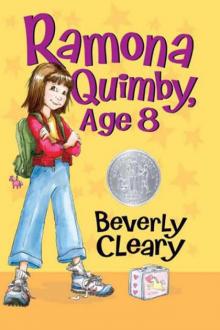 Ramona Quimby, Age 8
Ramona Quimby, Age 8 Dear Mr. Henshaw
Dear Mr. Henshaw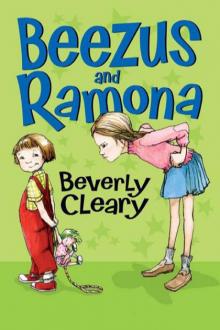 Beezus and Ramona
Beezus and Ramona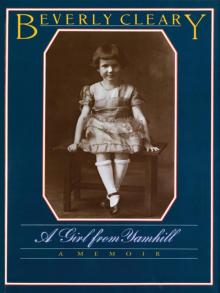 A Girl from Yamhill
A Girl from Yamhill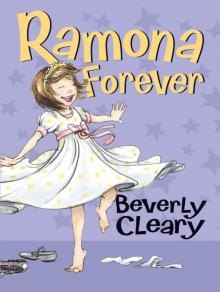 Ramona Forever
Ramona Forever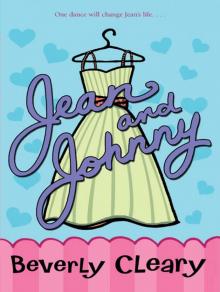 Jean and Johnny
Jean and Johnny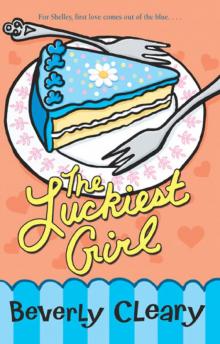 The Luckiest Girl
The Luckiest Girl Emily's Runaway Imagination
Emily's Runaway Imagination Ribsy
Ribsy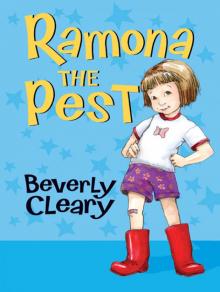 Ramona the Pest
Ramona the Pest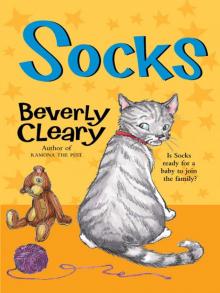 Socks
Socks Ramona's World
Ramona's World Strider
Strider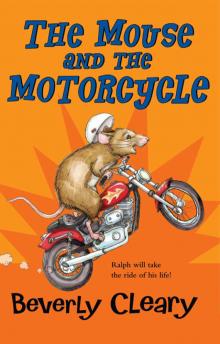 The Mouse and the Motorcycle
The Mouse and the Motorcycle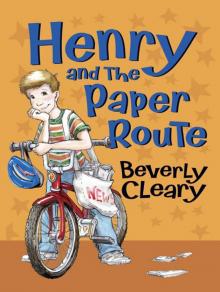 Henry and the Paper Route
Henry and the Paper Route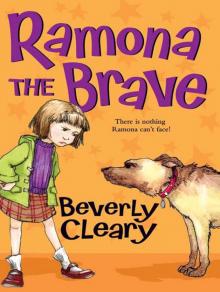 Ramona the Brave
Ramona the Brave Henry Huggins
Henry Huggins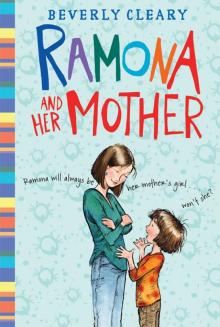 Ramona and Her Mother
Ramona and Her Mother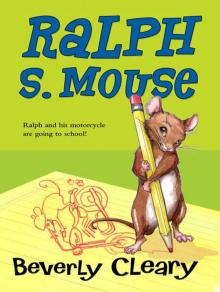 Ralph S. Mouse
Ralph S. Mouse Sister of the Bride
Sister of the Bride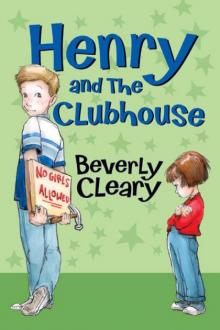 Henry and the Clubhouse
Henry and the Clubhouse Muggie Maggie
Muggie Maggie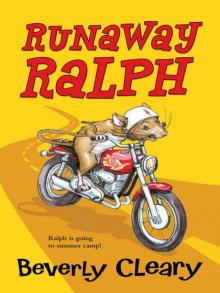 Runaway Ralph
Runaway Ralph Ramona and Her Father
Ramona and Her Father Henry and Ribsy
Henry and Ribsy Henry and Beezus
Henry and Beezus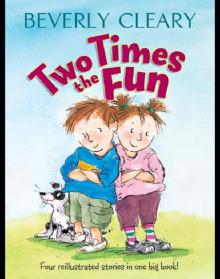 Two Times the Fun
Two Times the Fun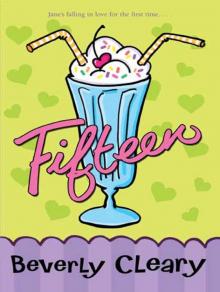 Fifteen
Fifteen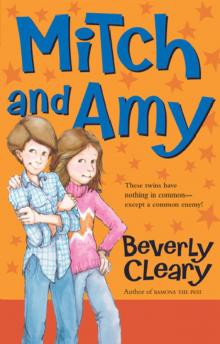 Mitch and Amy
Mitch and Amy